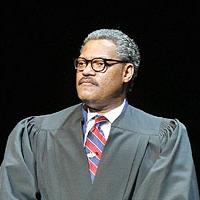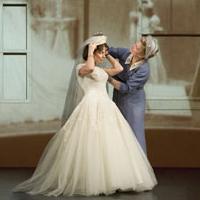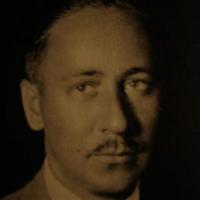Kristin Salaky - Page 4
June 30, 2008
Not a Julliard grad in the bunch, but Cirque Dreams Jungle Fantasy, though it plays at a theatre that once housed Ethel Merman, Alfred Drake and Bombay Dreams (just checking to see if you're paying attention) is not exactly aimed at the typical New York theatre audience and it certainly wouldn't be fair to review it as such. But that's not to say it isn't extremely entertaining and a perfectly fun bit of summer diversion. Kinda like Tarzan, the Musical without the book, music and lyrics.
June 25, 2008
Michael Reidel reports today that Bebe Neuwirth has been signed to play Morticia in Andrew Lippa, Rick Elice and Marshall Brickman's new Addams Family musical and that Nathan Lane is being sought to play hubby Gomez. That's all very well and good but the casting coup I'd like to see is Adam “Cubby Bernstein” Riegler for the role of Pugsley. I first caught Adam at the York Theatre's Mufti production of I And Albert where he absolutely slew the audience as a cockney juvenile delinquent, getting a roar of laughter and a big round of applause for saying one line. (It wasn't even a funny one.) I hear Adam has been nabbed for Shrek: The Musical, but maybe his agent can dig up some kind of loophole. As Lucy Van Pelt says, 'This kind of thing always has a loophole.'
June 22, 2008
As one of the critics who championed A Catered Affair, my favorite new musical of the season, I was sad to hear they've put up the closing notice. And while I understand Harvey Fierstein may be a little miffed at the reception the show received from many of the critics, I'm not especially happy to read the sweeping generalizations he's quoted as giving in a recent Michael Riedel column.
June 2, 2008
The time had already come and passed for The Faux Marx Brothers & Co. to hit the stage with the final performance of The York Theatre's Mufti production of Minnie's Boys on Sunday night when Producing Artistic Director Jim Morgan announced that the show had to be held up a bit because there were people stuck in the theatre's elevator.
May 14, 2008
London's Olivier Awards divides plays into categories honoring 'Best Play' and 'Best Comedy.' Do you think the Tonys should do the same? Let us know on our new poll.
May 12, 2008
There's little drama to be had in first-time playwright George Stevens, Jr's solo play, Thurgood, a textbook review of the career of civil rights attorney and eventual U.S. Supreme Court JustIce Thurgood Marshall. Set at the Howard University Law School Auditorium with The Playgoers serving as the title character's audience, the ninety minute piece offers a chronological telling of his personal history without much happening in the immediate present. It's a bit like watching a historical documentary of a familiar story with none of that great archival footage.
April 29, 2008
Every so often a musical comes to town that we're told, 'Breaks all the rules!,' and 'Changes Broadway Forever!' That's nice. Usually this has something to do with having rock music, weak story-telling and an advertising campaign that convinces you that it's like nothing else Broadway has ever seen.
April 15, 2008
Let's assume our next president stays perfectly healthy and impeachment-free throughout his or her administration and our next vice-president has no official responsibility other than presiding over the senate. Our new poll asks which Broadway star you'd like to see as our new veep.
April 13, 2008
Lighting designer R. Lee Kennedy has a planetarium's worth of stars flooding the Connolly Theatre's stage at the outset of Transport Group's production of Nancy Shayne's new musical, Marcy In The Galaxy. But gleaming through the clusters is the face of Donna Lynne Champlin, shining with hopefulness and wonder. The galaxy her title character occupies is actually the Galaxy Diner of Hell's Kitchen but Marcy is also one of the countless number of barely distinguishable stars that form the spiraling galaxy of Manhattan. The musical's story of a struggling artist nearing 40 and wondering for how long she can continue the struggle is a familiar one, but though Shayne's material offers no unique spin, her chamber musical is an inviting and sincere charmer mounted by Jack Cummings III with a light and whistful touch.
March 28, 2008
You know those very annoying packs of young drunkards you run into around 3am or so while wandering the bar-stuffed streets of the Lower East Side or the West Village, trying to find the nearest open pizza joint or Gray's Papaya in a quest to carbo-absorb the evening's alcoholic intake? The kind that insists on merrily prancing the pavement with their voice volumes set to 11 and their wits set at 3rd grade, so excited to be partying in the city? Adam Bock wrote a whole play about them! Well, maybe not a whole play… is ninety minutes a whole play? But in any case, you know something… Once you get to know these annoying brats, they're actually kinda fun to be with. At least when the things they say are written by Adam Bock and Trip Cullman directs the way they say them.
March 4, 2008
Last week we asked which guy musical theatre character you would least like to have as your blind date. Now we have Part 2, for those who date dolls. Vote today!
February 27, 2008
February of 2008 has turned out to be a heck of a terrific month for non-traditional and daring Off-Broadway musicals. (Do we have any more opening by tomorrow night?) Following the exhilarating Next To Normal and the entrancingly Dadaist The Blue Flower we now have Joshua Schmidt (music and libretto) and Jason Loewith's (libretto) haunting chamber piece, Adding Machine, based on Elmer Rice's 1923 Expressionist drama. To call it 'old-fashioned' would be misleading, but one of the pleasures of Adding Machine is that it recalls a time when political and social protest musicals were not uncommon among Gotham's theatrical offerings.
February 20, 2008
It took barely a sip of post-theatre cocktail for one of my companions to breathe a mournful sigh in memory of the lost art of letter writing. I imagine this was not the first time such sentiments were expressed following a performance of Vita & Virginia, Eileen Atkins' cerebrally romantic stage piece crafted from nearly 20 years of correspondence between the celebrated Virginia Woolf the her less-remembered fellow Bloomsburyist Vita Sackville-West which began scantly after their first introduction in 1922.
February 12, 2008
We all know that famous names sell tickets on Broadway. Any one of these ladies would most likely be (or have already proven to be) box office gold, but which of them would you most like to see?
February 4, 2008
When Tama Janowitz coined the phrase 'Slaves of New York' with the title of her 1986 collection of short stories, she was referring to how the lack of affordable apartments in the city flings people into quick romantic commitments or has them cling onto unhealthy ones for the sake of having a place to stay. In Brooke Berman's cleverly titled Hunters and Gatherers, a reference to societies that seek out food rather than farming, the real estate market hasn't grown less competitive but the computer age (especially Craig's List) has made it easier for people to hop around various short-term situations when the opportunities to plant roots are bleak and to escape the bad ones with a few mouse clicks and a successful interview.
February 2, 2008
As much as I enjoy listening to some Kander and Ebb anytime, it's very refreshing to see a young performer do a complete show about New York without hearing that all-too-familiar vamp. Making his cabaret debut with a one-night gig at The Metropolitan Room, Ben Cherry shows himself to be an engaging performer with an attractive light baritone, but more importantly, displays a knowledge of the necessities of cabaret performance that often eludes beginners in the field.
January 31, 2008
'Me Benchley. Benchley bad boy. Benchley go.' Theatre critic and Algonquin Round Table founding member Robert Benchley was heard muttering the above words as he got up from his chair and walked out in the middle of the opening night performance of Jean Bart's 1926 Broadway play, The Squall. What prompted his departure was that Suzanne Caubet, playing the role of a gypsy girl who spends the entire evening speaking in a cartoonish broken English, had just uttered the line, 'Me Nubi. Nubi good girl. Nubi stay.'
January 28, 2008
Although I was set to see The Little Mermaid shortly after its opening, an actor's absence due to illness resulted in the rescheduling of many press seats to later dates, which is why I'm posting this a good two and a half weeks after the big night. Live theatre, kiddies.
January 27, 2008
On Monday night Christine Pedi will be receiving a New York Nightlife Award for Great Dames, her 2007 salute to notable ladies of the stage and screen. But as award-worthy as that cabaret show was, her latest, Now I Have Everything: The Lyrics of Sheldon Harnick, is even better. This is a master class in musical theatre acting and a heck of an entertaining night out.
January 11, 2008
The Tampa Bay Performing Arts Center's web site sports an unusual parental warning for their upcoming production of Jersey Boys: Jersey Boys is not recommended for children under the age of 16 due to strong 'authentic Jersey' language. Catherine Skidmore, who brought the warning to my attention, says, 'I'm still trying to figure out if 'profanity' is a dialect.'
« prev 1 2 3 4 5 6 7 … 13 next »
Videos

















